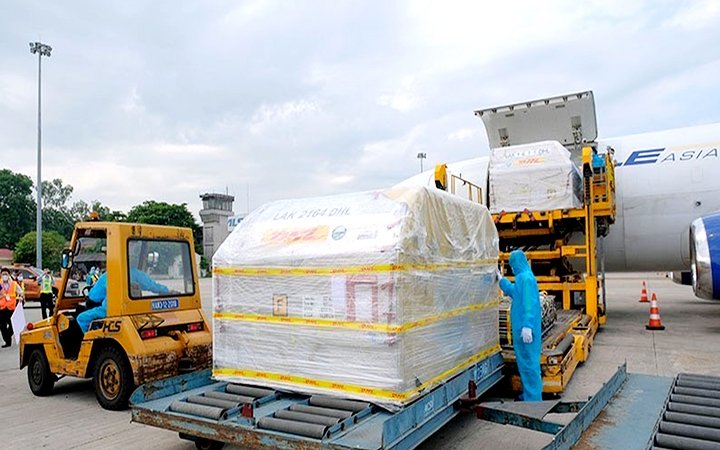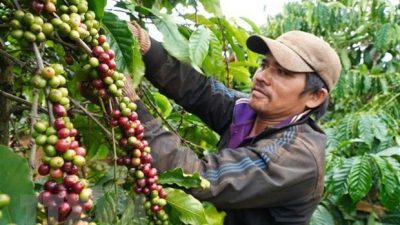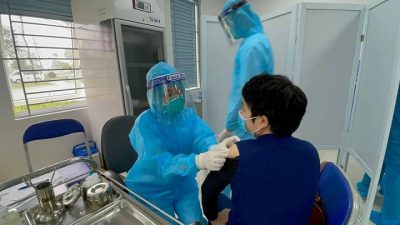
|
In the Government’s COVID-19 vaccine strategy, vaccine diplomacy is one of the spearheads to get the fastest and most effective access to foreign-made vaccine supplies, Deputy Minister of Foreign Affairs Nguyen Minh Vu told reporters in a recent interview. |
|
The pandemic is developing complicatedly around the globe, especially in Southeast Asia, and Vietnam is not an exception. The country has been internationally recognised for effective COVID-19 response as it is among the 10 nations with the lowest count of infections and deaths despite being the world’s 15th most populous country, Vu said. However, the pandemic fight remains challenging for Vietnam in the time ahead as the country has been hit hard by the larger fourth wave of COVID-19 due to the wide spread of the more contagious Delta strain. He hailed vaccine access and immunisation as the extremely important solutions in the fight against the disease. Since the onset of COVID-19 in the world and Vietnam, the Politburo, the Party Central Committee’s Secretariat and the Government have taken comprehensive measures to respond to the pandemic, including the adoption of a vaccine strategy with three key points – accessing external sources of vaccine supply, strengthening international cooperation in technology transfer and vaccine production, and facilitating domestic vaccine development, in order to ensure safe and effective mass inoculation. In this vaccine strategy, vaccine diplomacy is a very important spearhead and an urgent and long-term solution to ensure enough vaccines for Vietnamese people and pave the way for the recovery of economic activities, Vu said. He held that Vietnam has been drastically implementing its vaccine strategy and vaccine diplomacy at all levels, especially at the high level, with the active engagement of the Party General Secretary, State President, National Assembly Chairman, and especially the Government and Prime Minister in the efforts to access vaccine supplies. The Prime Minister has drastically directed the Ministry of Health, the Ministry of Foreign Affairs and relevant ministries and branches, along with more than 90 overseas Vietnamese representative agencies, to participate in the mission, the official continued. None of hundreds of phone calls and meetings have gone without the Party and State leaders discussing ways to step up vaccine cooperation and vaccine access with domestic and foreign partners. According to the Deputy Foreign Minister, Vietnam’s vaccine diplomacy has achieved a number of positive results thus far. Specifically, the country has received 2.6 million doses of vaccine via the COVAX Facility. COVAX has also committed to prioritising Vietnam in the next distributions, immediately delivering two million doses of Moderna vaccine provided by the US to the country this July 10. China has donated 500,000 vaccine doses to Vietnam, with the figure likely to increase in the coming time. Meanwhile, Japan has vowed to present two million doses of the AstraZeneca vaccine to Vietnam, half of which arrived in Hanoi on June 16, and another 400,000 arrived in Ho Chi Minh City on July 2. The remainder, possibly more, will be on the way next week. Workers in Ho Chi Minh City are being vaccinated against COVID-19. He added that Russia has donated 1,000 doses to Vietnam and agreed to provide up to 20 million doses of Spunik V vaccine for the country in 2021, and will cooperate with Vietnam’s VABIOTECH Company to pack and transfer vaccine technology from July 2021. The US has put Vietnam on the priority list to receive vaccine aid among its total 80 million doses pledged to the COVAX mechanism. In addition, Cuba, the UK, Germany, Australia, India and some other countries have also made specific commitments to Vietnam. Not just bilaterally, Vietnam has actively participated in vaccine diplomacy via the multilateral channel as well, calling on the international community to work out solutions to vaccine inequality and vaccine scarcity, the official said. At the summit between the Communist Party of China and political parties in the world on July 6, Party General Secretary Nguyen Phu Trong emphasised the current urgent task of protecting people’s happiness and promptly repelling the pandemic. During the high-level debate of the United Nations Security Council, the International Conference on the Future of Asia, or the Partnering for Green Growth and the Global Goals 2030 (P4G) Summit, President Nguyen Xuan Phuc and Prime Minister Prime Minister Pham Minh Chinh all highlighted the importance of the international community joining hands to soon solve the problem of vaccine shortage and ensure equitable distribution of vaccines to developing and underdeveloped countries. Not only that, Vietnam has also contributed US$500,000 to the global vaccine fund, which is highly appreciated by the world. Vu affirmed that amidst serious vaccine scarcity globally, with the efforts of the whole political system, Vietnam has attained initial important results, making the goal of receiving 10 million vaccine doses in July and August achievable. Regarding how to access additional vaccine supplies from now until the end of the year to ensure the success of the national vaccine strategy, the Deputy Foreign Minister said that the Government and the Prime Minister are urging for more drastic and effective vaccine diplomacy in the time ahead, focusing on three major directions. Firstly, coordination between relevant ministries and branches, especially the Ministry of Health, will be strengthened to follow up the commitments made by suppliers to providing Vietnam with 150 million shots of vaccines, enough to inoculate 70% of its population. Secondly, Vietnam will continue to mobilise bilateral partners and international organisations to provide the country with more doses. Thirdly, cooperation in technology transfer and vaccine production will be accelerated to serve long-term vaccine manufacturing. This is a fundamental problem to ensure Vietnam has a long-term and stable source of vaccines, while promoting international cooperation to create favorable conditions for domestic vaccine production. Source: Nhan Dan Online |


